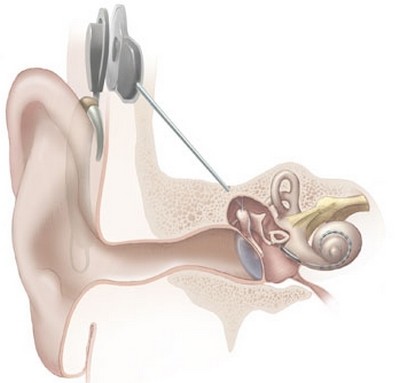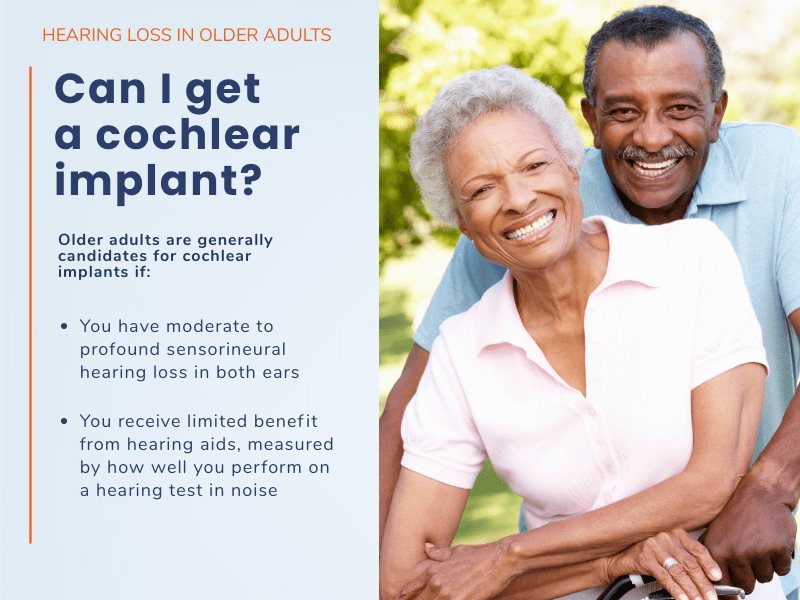|
www.HealthyHearing.com |
I’m an older adult with severe hearing loss. Can I get a cochlear implant?Age shouldn't be a barrier, experts say
Contributed by Temma Ehrenfeld We're commonly asked by readers who are 65+ if cochlear implants might be a suitable option for them. The answer is yes—provided you meet the candidacy guidelines for surgery. Up to 53 million people worldwide live with severe to profound hearing loss. Hearing aids work well for many people, but are not always adequate. Fortunately, there is another option: Cochlear implants, which are small devices surgically installed in your ear that stimulate the auditory nerve directly with electrical currents. The implant bypasses injured hair cells and provides information that can improve speech perception. Cochlear implants were once offered mainly to deaf or near-deaf children. But research shows that adults can benefit as well. According to a global consensus report from 31 hearing experts published in August 2020, age shouldn’t be a factor in your decision. Older adults can benefit as much as younger adults, they say, though it’s best to get the implant as soon as you can. Older adults and cochlear implants: What are the guidelines?Senior citizens are generally candidates if:
However, your doctors may or may not recommend an implant in other circumstances.
‘My hearing is phenomenal’Father Bob Evans is a 65-year-old Catholic parish priest in a suburb of St Louis, Missouri. He first began wearing hearing aids in his late forties, but his hearing gradually declined and for decades he could only hear with his left ear. “Being a priest you want to call people by name,” he said. When he misunderstood three names, he decided to get a cochlear implant in his right ear. Not long after, while sitting alone in his room one day, he heard a noise and wondered what it was. It was a clock ticking. “I hadn’t heard that in 25 years,” he says. In February, impressed with the results, he received an implant in his left ear to hear better in groups. “Now I can be part of conversation. Before in a crowd it was difficult to understand what people were saying. It’s improved my interaction with the congregation quite a bit,” he says. “My hearing is phenomenal.” At 57, Shelley Hull, who lives a half hour from London, is considering the procedure. Born with a rare disease that distorted her face, Hull can hear minimally only in her right ear. In her memoir Shelley, she describes her struggle as a young girl and teen who endured more than 20 surgeries. Another surgery isn’t exactly her cup of tea, but she wants a better chance to enjoy conversation. “My hearing is deteriorating very quickly and although I have a super-power hearing aid which is extremely helpful, there are many times the sound becomes distorted,” she explains. She has fluid in her ear canal, and because it is narrow, fitting an ear mold is difficult. “Noisy places or rooms with an echo are a nightmare for me. Communication is virtually impossible,” she says.
What will my hearing be like with a cochlear implant?A cochlear implant can give you the ability to pick up a variety of ordinary sounds, speak on the phone and enjoy music. According to the Food and Drug Administration (FDA), the benefits of a cochlear implant range widely. For people with implants, the FDA states:
More: 102-year-old WWII veteran receives cochlear implant If you’ve worn a hearing aid: How implants are different
inside the cochlea, the round spiral organ on the right. An implant comes in two parts. One part, like many hearing aids, sits behind the ear. It picks up sounds with a microphone, processes the sound and transmits it to the internal device. The internal processor has been surgically implanted in the inner ear. A thin wire and small electrodes lead to the cochlea, part of the inner ear. The wire sends signals to the auditory nerve. Maintenance will not be very different. As with hearing aids, you’ll probably take out the external sound processor at night (some people wear it so they can hear noises in the night). You may use disposable or rechargeable batteries. People typically recharge the battery every night. Note: Implant batteries do not last as long as hearing aid batteries. You’ll also use a drying kit at night to remove any moisture absorbed during the day. You’ll need to take the kit with you when you travel. Also similar to hearing aids, it’s possible to wear your external sound processor when you exercise or play sports but it is not waterproof. The surgically implanted device is meant to last a lifetime. But you may need to replace the external part. You can still use assisted hearing devices that run on Bluetooth or FM systems. However, when you fly you’ll need to carry a card to show the security personnel, since the device will set off the detectors. Cochlear implant surgery in seniorsBefore the surgery, the FDA explains that your doctor or other staff will shave a small amount of hair around the implant site, insert an intravenous (IV line) and attach equipment to your skin needed to monitor your vital signs. You’ll wear a mask for oxygen and anesthesia. You’ll be supervised until the anesthesia has worn off. Immediately after you wake, you may feel pressure or discomfort over your implanted ear, and have other common side effects of anesthesia such as dizziness or nausea. You'll receive instructions about caring for the stitches, washing your head, showering, and general care for surgery recover. About a week later, your stitches will be removed and your implant site will be examined. You’ll need at least two weeks for swelling to subside. Before the implant is turned on, you will be able to hear from your other ear and may have residual hearing in the implanted ear. The benefits will not emerge until the implant is activated, generally about 3 to 6 weeks after surgery. What are the risks of cochlear implant surgery for older people?Fortunately, the risks occur rarely. The risks of surgery and anesthesia are higher with age or if you have immune or other conditions that make you susceptible to infection. Your main risk may be disappointment, if you enter the surgery with especially high hopes. It’s possible to have little or no improvement in your hearing, though unlikely. “Ninety plus percent do vastly better with the implant,” says Dr. Craig Buchman, a neurotologist and head of the department of otolaryngology at Washington University School of Medicine in St. Louis, who treated Father Bob. One extremely rare possibility is damage to the nerve that allows you to move facial muscles. A nerve that gives taste sensation to the tongue also could be injured; however, since we have four taste nerves that go to our tongue, you may not even notice. Some patients experience temporary losses in taste. For other risks, please see the detailed list provided by the FDA. Adapting to a cochlear implant as an older adultAs she mulls her options, Hull wonders “what the actual sounds will be when the cochlear is switched on and how different these will sound from what I’ve been used to,” she says. It’s true that people with a cochlear implant sometimes experience the sound as odd. “As you lose your hearing, your brain is changing, adapting to the limited information you’re getting,” explains Dr. Buchman. “What you’re used to is degraded. By three months, the vast majority of people are having good speech understanding and awareness. The brain takes the information and clarifies it.” You’ll need three or four programming sessions to fine-tune your device for your needs. You’ll also consult with specialists to see how much help you need with speaking and understanding sounds. A standard “aural rehab” program might be 6 to 10 sessions weekly, or as needed. You may find that you are better able to control how loudly you speak and can understand speech more clearly. Can Medicare pay for a cochlear implant?Yes! Unlike hearing aids, a cochlear implant is covered by Medicare if you recognize sentences with your hearing aids only 40 percent of the time or less. If you score between 40 and 60 percent, you may be eligible if your provider is participating in a clinical trial. You may also have coverage from Medicaid (with some variation by state) and many private insurance carriers. Coverage for aural rehab may be limited, but you can ask your provider to argue on your behalf. If you aren’t getting enough help from hearing aids, ask your doctor or audiologist if you’re a candidate. |
Featured clinics near me
Earzlink Hearing Care - Reynoldsburg
7668 Slate Ridge Blvd
Reynoldsburg, OH 43068

Find a clinic
We have more hearing clinic reviews than any other site!


